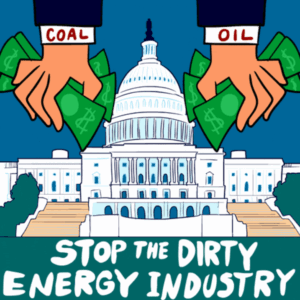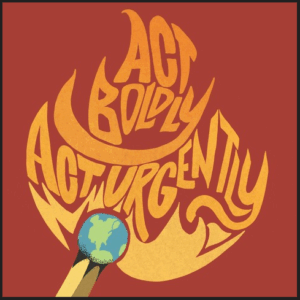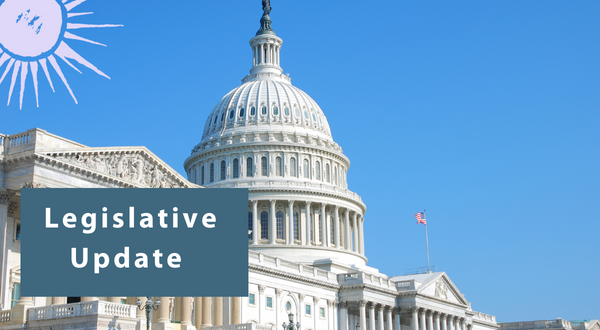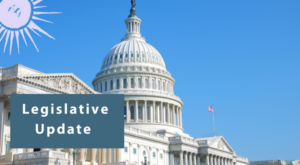
After the Budget Bill: What’s at Stake for Our Common Home — and How We Respond
Drake Starling
July 18, 2025
From the coasts of California to the coalfields of Appalachia, from Midwestern farms to Gulf Coast towns, families across the country want the same things: clean air, safe water, a livable planet, and a future full of opportunity. That’s why, in 2022, communities of faith and frontline advocates alike came together to help push the historic Inflation Reduction Act (IRA) across the finish line—bringing with it groundbreaking investments in clean energy, environmental justice, and climate resilience.
But now, much of that progress is on the chopping block. The budget reconciliation bill that just narrowly passed in Congress rolls back key provisions of the IRA, gutting investments in clean energy, rescinding funds for frontline communities, and stalling the just transition we’ve fought for. Why? Because the Republican lawmakers who backed this bill chose to prioritize the profits of fossil fuel executives over the well-being of their constituents. This bill isn’t about fiscal responsibility—it’s about letting polluters off the hook.
In the wake of Congress passing the budget reconciliation bill, we at NETWORK are reflecting on the devastating toll this legislation takes on our environment — and the people and communities who bear the brunt of environmental harm. We know the true cost of this bill: polluted air, unsafe water, and a dangerous step backward in the fight to protect our climate.
 A Blow to Clean Energy and Creation Care
A Blow to Clean Energy and Creation Care
The budget reconciliation bill strips away billions in clean energy investments that were once made possible through the historic Inflation Reduction Act. These investments supported wind and solar energy projects, domestic clean manufacturing, and affordable electricity for millions of families. Now, with clean energy tax credits rolled back and critical funding rescinded from the Department of Energy’s Loan Programs Office, we face the chilling prospect of stalled innovation and rising energy costs, especially for low-income households.
Clean Water Under Threat
The reconciliation bill also rescinds funds meant to improve water infrastructure and protect communities from toxic pollution. The backers of this bill gutted grants to replace lead pipes, clean up PFAS contamination, and address long-standing water inequities in marginalized communities. This decision endangers public health and disproportionately harms communities of color, Tribal nations, and rural families already facing unsafe drinking water.
Sacrificing Clean Air for Corporate Polluters
Perhaps most abhorrent is the bill’s attack on clean air. The bill’s backers slashed the Environmental Protection Agency’s budget and eliminated programs designed to reduce carbon emissions and monitor air pollution near schools and ports. They also weakened enforcement of the methane emissions fee—a critical tool for reducing one of the most potent greenhouse gases—and offered new giveaways to fossil fuel CEOs under the guise of “permitting reform.”
Our Faith Calls Us to Respond
At NETWORK, we believe in a government that protects the dignity of all people and cares for our Common Home. The decisions made in this budget bill are not just policy choices — they are moral choices. Pope Francis was clear: “The climate crisis is not merely an environmental issue; it is a social issue.” But once again, the lawmakers voting for this bill were willing to sacrifice our communities—our health, our economic stability, and our futures—all in the name of profit and corporate greed.
What We’re Doing Now
We’re not standing idly by. In response to this dangerous legislation:
- We are mobilizing our faith partners to act boldly, including through writing op-eds and letters to the editor and holding district meetings with lawmakers who supported these cuts.
- We are defending what’s left of the Inflation Reduction Act by lobbying Congress to protect and restore funding for clean energy tax credits, energy efficiency programs, and environmental justice initiatives.
- We are educating our supporters and all people of goodwill through webinars, briefings, and faith-based materials that explain what’s at stake — and how our Catholic values compel us to act.
- We are building coalitions with environmental, labor, and faith-based partners to resist further rollbacks and to demand a just transition to a clean energy economy that centers workers and frontline communities.
This moment is difficult, but it is not the end. We are grounded in hope, fueled by faith, and committed to justice. Together, we will continue to advocate for policies that protect creation and promote the dignity of all people.
 Take Action
Take Action
Contact your elected officials. Tell them that slashing climate, clean air, and clean water funding is unacceptable. Urge them to reject future rollbacks and to support legislation that heals both people and the planet.
Because justice demands it. And faith compels it.









